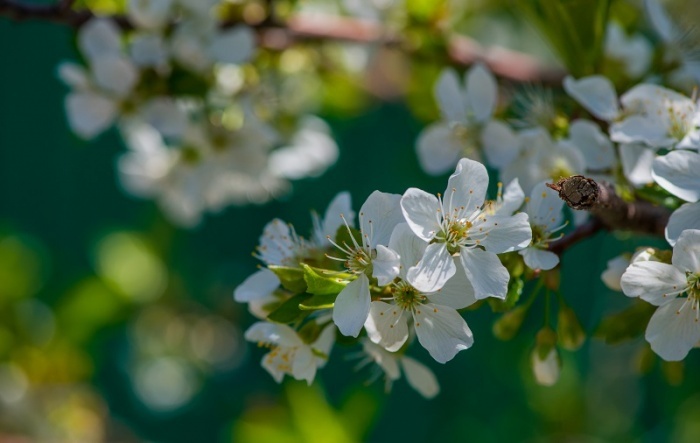By Rabbi Tsvi Heber
ברוך א”י אמ”ה שלא חיסר בעולמו כלום וברא בו בריות טובות ואילנות טובות ליהנות בהם בני אדם[i]
The month of Nissan brings in all the hustle and bustle of Pesach preparations. While we are hard at work preparing for Yom Tov inside the home, Hashem’s Hand is at work outside preparing the world for the upcoming spring season. Chodesh Nissan is Chodesh Ha’Aviv [ii], the month of blossoms. Once a year [iii] at the beginning of the spring season when the fruit trees [iv] begin to blossom we have an opportunity to recite a special bracha called Birkas Ilanos. Reciting this bracha allows us to contemplate the Creator’s wisdom and goodness both of which are manifested in nature and to praise and thank Him for all that He does for us on a daily basis [v]. While recitation of this bracha is prompted only by viewing the blossoms of a fruit tree, the Poskim [vi] and Baalei Kabbalah [vii] strongly encourage us [viii] to go out of our way to find the opportunity to do so in order to recite the bracha.
In Eretz Yisrael, the opportunity to recite birkas Ilanos begins in Chodesh Nissan.[ix] In some communities, the kehila gathers together[x] to recite the bracha on Erev Pesach or on Chol Hamoed.[xi] In colder climates like Toronto, it is highly unlikely that fruit trees will begin blossoming before Iyar or even Sivan so the bracha should be recited when the fruit trees begin to bloom.[xii] In fact, our brethren who live in the southern hemisphere will recite the bracha during the month of Tishrei![xiii]
Those who have not had the opportunity to see a fruit tree and recite the bracha at the early stages of blossoming, can still recite it until the fruit is ripe but not thereafter.[xiv] Some refrain from reciting the bracha on Shabbos since there is a concern that we may not be careful and we may accidentally touch the tree or even pick a fruit off of the tree.[xv] That said, if the opportunity to recite the bracha will not easily arise during the week he should recite the bracha on Shabbos.[xvi] During the Shemittah year, it is permitted to recite the bracha upon a tree that is subject to the laws of Shemittah even if the farmer is not keeping Shemittah properly.[xvii]
According to kabbalistic sources, after the recitation of birkas ilanos, it is customary to give tzedaka and pray for the geula ha’asida – the final redemption – may it come speedily in our days.[xviii]
בניסן נגאלו אבותינו ממצרים ובניסן עתידין להגאל[xix]
Rabbi Tsvi Heber is COR’s Director of Community Kosher
[i] בספר כף החיים או”ח סימן רכ”ו ס”ק ח מביא כל הנוסח של ברכת אילנות
[ii] שמות [י”ג:ד]
[iii] שלחן ערוך או”ח [רכ”ו] ז”ל ואינו מברך אלא פעם אחת בכל שנה ושנה
[iv] משנה ברורה שם ס”ק ב דווקא באילני מאכל שמזה הפרח עתיד להתגדל פרי אבל אילני סרק לא
[v] ערוך השלחן [רכ”ו:א]
[vi] לדוגמא עי’ בא”ר שם ס”ק א ובהליכות שלמה פרק כ”ג הערה 121
[vii] עי’ בספר פתח הדביר שמביא דברי הזהר הקדוש פ’ בלק דף קצ”ו: ובספר כף החיים שם ס”ק ו
[viii] ולענין נשים יש לעיין אם יש להן חובה להשתדל בכך עי’ בשו”ת תשובות והנהגות [א:ק”צ]
[ix] וי”א דווקא בחודש ניסן וכ”כ בכף החיים שם ס”ק א שלא לברך בשם ומלכות אלא בחדש ניסן
[x] עי’ בכף החיים שם ס”ק ז
[xi] פסקי תשובות שם הערה 10
[xii] ערוך השלחן שם
[xiii] שו”ת הר צבי [א:קי”ח]
[xiv] משנה ברורה שם ס”ק ד
[xv] כף החיים שם ס”ק ד
[xvi] הליכות שלמה פרק כ”ג הערה 121
[xvii] הליכות שלמה שם אות ל
[xviii] כף החיים שם ס”ק ח
[xix] גמ’ ראש השנה [י”א]

